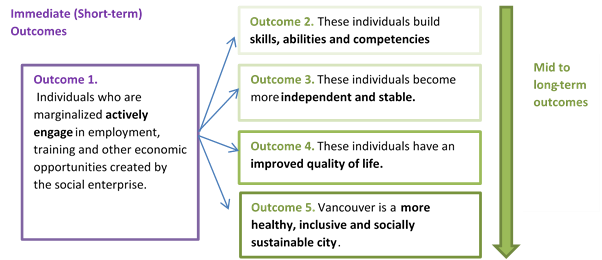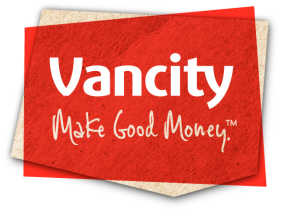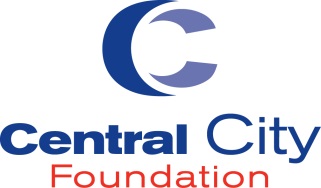Vancity Community Foundation led a project that investigated the collective impacts of social enterprises in Vancouver that are providing employment, training and income generating opportunities for people who are marginalized ('Work Integration Social Enterprises' 'WISE'). This project developed the following research, tools and resources.
1. An Impact Map and Measurement Framework:
The following impact map depicts shared outcomes for WISE enterprises. It was developed through a workshop in the fall of 2014 that involved a number of social enterprises in Vancouver.
An impact map (logic model) typically illustrates the path between what an organization does (inputs and activities), what it creates (outputs) and what further changes occur (outcomes). While each social enterprise differs in the business product/service created, and how it does this (their inputs, activities and outputs), they all go out of their way to include people who are marginalized in the business, and see how this positively impacts a person and their community (shared outcomes).

As a follow-up to this mapping exercise, we researched indicators that could represent these outcomes. This is based on finding indicators that could draw on one or more of the following six criteria:
- They draw on validated assessment tools that have been tested for reliability and validity, particularly in relation to the population and context.
- They have been used in evaluations of employment and social support programs (and social enterprise where available).
- They relate to indicators that have been defined at a planning and/or policy level for understanding community development and health inequity (for instance, by the City of Vancouver, Vancouver Coastal Health and other agencies where applicable).
- They can be related to measures collected through the BC Social Enterprise Survey.
- They are easy to collect and understand, and could be integrated easily into the operations of the enterprise.
- They relate to academic research that have investigated the impact of supportive employment and/or social enterprise.
You can see the results of this research here:

Impact Map and Measurement Framework (includes indicators and reserach review)
Indicators (This includes the results of 'voting exercise' in which workshop participants applied stickers to the indicators that they found to be most relevant and useful to them)
2. A ‘Societal Cost Impact Calculator’
A calculator was developed to estimate how successfully engaging individuals who are marginalized in employment could influence poverty-related outcomes and associated societal costs. It draws on empirical research about the links between employment and health, wellness and other societal outcomes and relates this to data that most social enterprises are tracking.
Here is a paper released in 2015 that explores how such a calculator could be developed and what it may look like:
 Developing a Societal Cost Impact Calculator
Developing a Societal Cost Impact Calculator

Societal Cost Impact Calculator: Method
Who was involved
Demonstrating Value's Community Partner, the Vancity Community Foundation, led the project with funding support from Central City Foundation, Vancity Savings Credit Union, and the Vancouver Foundation.
Research Team
- Project Lead: Bryn Sadownik, Program Manager of Evaluation and Community Impact, Vancity Community Foundation (and Chair, Board of Directors, Demonstrating Value Resource Society)
- Research Support: Donato Pagano, Master of Arts candidate in Sustainability Economics, University of Kassel, Germany
- Workshop Facilitation: Marina Niks, PhD. Evaluation and research consultant.
If this project is of interest to you, and you interesting in contributing to further advancing this work, please contact Bryn Sadownik (via the contact form on this website) for ways that you could become involved. We welcome offers of additional funding support that could increase the scope of the project.





